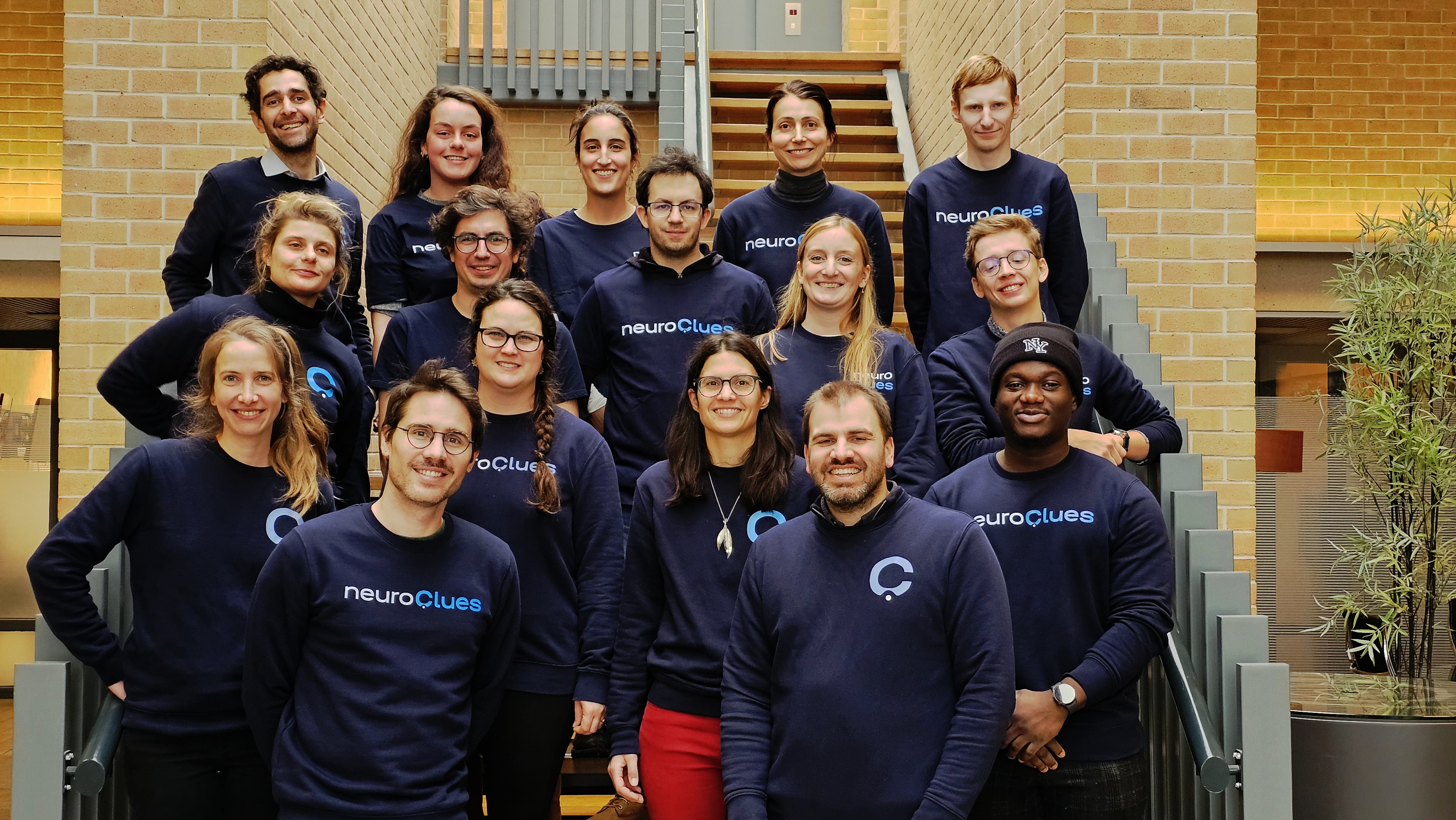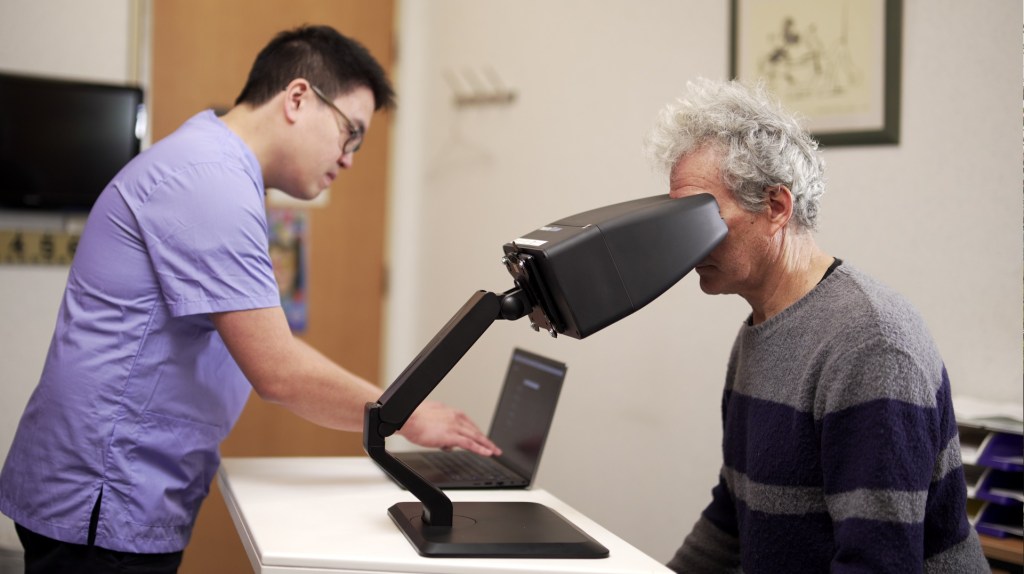The eyes aren’t just a window into the soul; tracking saccades can help doctors pick up a range of brain health issues. That’s why French-Belgian medtech startup neuroClues is building accessible, high-speed eye-tracking technology that incorporates AI-driven analysis. It wants to make it easier for healthcare service providers to use eye tracking to support the diagnosis of neurodegenerative conditions.
The company is starting with a focus on Parkinson’s disease, which already typically incorporates a test of a patient’s eye movement. Today, a doctor asks a patient to “follow my finger,” but neuroClues wants clinicians to use its proprietary, portable headsets to instead capture eye movements at 800 frames per second, after which they can run an analysis of the data in just a few seconds.
The three-and-half-year-old outfit’s founders — two of whom are neuroscience researchers — point to high rates of misdiagnosis of Parkinson’s as one of the factors informing their decision to focus on the disease first. But their ambitions do pan wider. They paint a picture of the future in which their device becomes a “stethoscope for the brain.” Imagine, for example, if your annual trip to the optician could pack in a quick scan of brain health, and compare you against standard benchmarks for your age. According to the startup, which says it aims to help 10 million patients by 2032, eye tracking protocols could also help test for other diseases and conditions, including concussion, Alzheimer’s, multiple sclerosis and stroke.
The startup is in the process of filing an application for FDA approval and hoping to gain clearance for use of its device as a clinical support tool in the U.S. later this year. It is working on the same type of application in the European Union and anticipates gaining regulatory approval in the EU in 2025.
So how does the device work? The patient looks through the headset and sees a screen where dots appear. A clinician will then tell them to follow the dots with their eyes, after which the device extracts data that can be used as disease biomarkers by recording and analyzing their eye movements, measuring things like latency and error rate. It also provides the clinician with a standard value expected from a healthy population to compare with the patient’s results.
“The first scientific paper that is using eye tracking to diagnose patients is 1905,” neuroClues co-founder and CEO Antoine Pouppez told TechCrunch in an exclusive interview, noting the technique was initially used for diagnosing schizophrenia. In the 1960s, when video eye trackers arrived, there was a boom in research into the technique for tracking neurological disorders. But decades of research into the usefulness of eye tracking as a diagnostic technique has not translated into widespread clinical uptake because the tech wasn’t there yet and/or was too expensive, said Pouppez.
“That’s where this technology comes from: The frustration of my co-founders to see that eye tracking has a lot of value — that’s been demonstrated in research that has been clinically proven on thousands of patients in research setups — and it’s still not used in clinical practice,” he said. “Doctors today use their fingers — and literally say ‘follow my finger’ — whereas an eye is moving at 600 degrees per second. You’re doing three eye movements per second. And so it’s very, very difficult — close to impossible — to evaluate how well you’re moving around [by human eye alone].”
Others have similarly spotted the potential to do more with eye tracking as a diagnostic aid.
U.S.-based Neurosync, for example, offers a VR headset combined with FDA-cleared eye-tracking software it says can analyze the wearer’s eye movements “as an aid to concussion diagnosis.” The product is geared toward football players and athletes in other contact sports who face elevated risk of head injury.
There are also mobile app makers — such as BrainEye — pitching consumers on smartphone-based eye-tracking tech for self-testing “brain health.” (Such claims are not evaluated by medical device regulators, however.)
But neuroClues stands out in a variety of ways. First, it says its headset can be located in a regular clinician’s office, without the need for a dark room setup or specialist computing hardware. Second, it’s not using off-the-shelf hardware but is instead developing dedicated eye-tracking headsets for eye testing designed to record at high speed and control the recording environment. The outfit’s founders further argue that by building its own hardware and software, neuroClues enjoys unrivaled speed of data capture in a commercially deployed, non-static device.
To protect these ostensible advantages, neuroClues has a number of patents granted (or filed) that it says cover various aspects of the design, such as the synchronization of the hardware and software, and its approach to analyzing data.
“We are the only one on the market today that is recording 800 frames per second on a portable device,” said Pouppez, noting that the research “gold standard” is 1,000 frames per second. “There is no clinical or non-clinical product that is doing it at that frame rate, which meant that we had to lift barriers that no one had lifted before.”

neuroClues, which was incubated in the Paris Brain Institute, expects the first eye-tracking headsets to be deployed in specialist settings such as university hospitals, so for use on patients who have already been referred to consultants. It notes the service will be reimbursable via existing health insurance codes as eye-tracking tests are an established medical intervention. The company says it’s also talking to a number of other outfits in the U.S. and Europe that are interested in its hardware and software.
This first version of the device is designed as a diagnostic aid, meaning a clinician is still responsible for interpreting the results. But Pouppez said the team’s goal is to evolve the technology to serve up interpretations of the data, too, so the device can be deployed more broadly.
“Our goal is quickly to move down to bring that diagnostics capabilities to practitioners,” he told us. “We hope to be on the market with such a device in ’26/’27. And so to broaden up our market perspectives and really be in [the toolbox of] every neurologist in the U.S. and in Europe.”
The startup is announcing the close of a €5 million pre-Series A round of funding, led by White Fund and the European Commission’s EIC Accelerator program. Existing investors Invest.BW, plus a number of business angels, including Fiona du Monceau, former Chair of the Board at UCB, Artwall, and Olivier Legrain, CEO of IBA, also participated. Including this round, neuroClues has raised a total of €12 million since being founded back in 2020.
Pouppez said it will be looking to raise a Series A in the next 12 to 18 months. “Our existing investors and the European Commission have already shown interest in participating, so basically i’m looking for a lead investor,” he added.































Comment